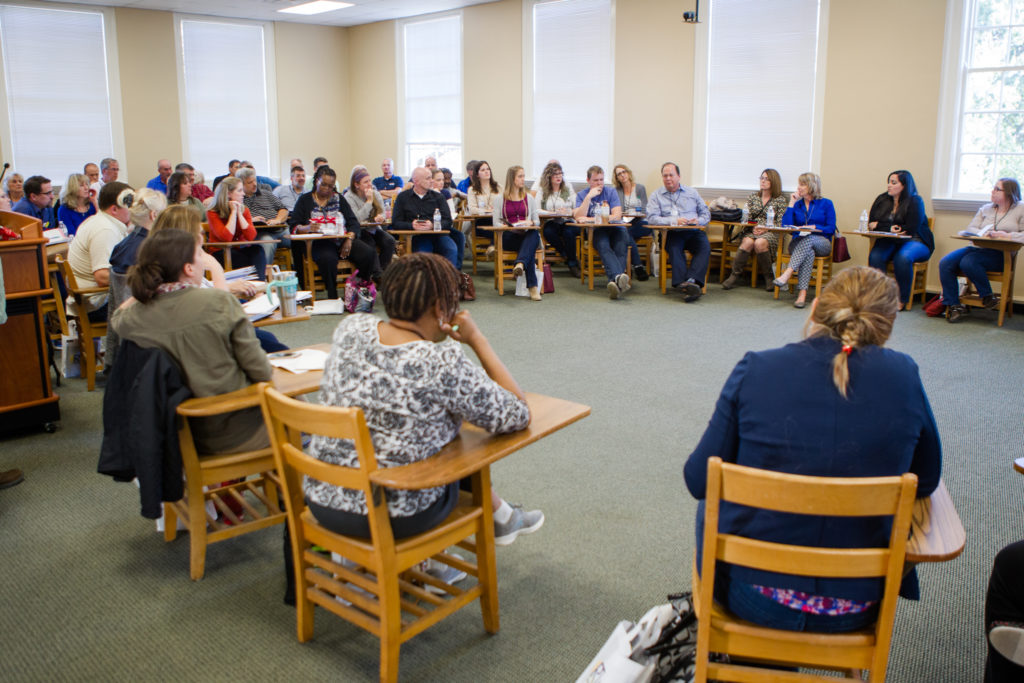Reaching the Nations across the street
Lauren Pratt | October 30, 2017

On Oct. 27-28, the Reaching the Nations in North America Summit brought together 515 in person and via live stream who are seeking to learn and grow in how to reach refugees and immigrants in North America.
Southeastern Baptist Theological Seminary hosted the conference, which began last year in Nashville, Tennessee.
Reaching the Nations was sponsored by Southeastern, the International Mission Board, the North American Mission Board, the Baptist State Convention of North Carolina and the Peoples Next Door Initiative. Speakers included Danny Akin, Chris Clayman, J.D. Greear, J.D. Payne and Bryant Wright.
J.D. Payne, pastor for church multiplication at The Church at Brook Hills in Birmingham, Alabama
Payne raised the question as to why people are willing to go overseas to share their faith but not walk across the street to talk to their neighbor who is from an unreached part of the world. As the first speaker of the conference, he addressed the challenges of reaching neighbors with the gospel.
Challenges included defining what a church should be, pastoral missiology and not letting the goal of numbers become ultimate over ministry.
Payne encouraged attendees to create biblical, simple and reproducible ministry models that “ordinary, everyday believers” can follow.
“By God’s grace, when you begin to teach through a simple approach of biblical church planting, when you begin to catch the vision of lostness of unengaged and unreached people groups in North America, the Holy Spirit begins to work on people,” said Payne.
Danny Akin, president of Southeastern Baptist Theological Seminary
Akin’s challenge Friday night was to see immigration through a Great Commission vantage point, drawing upon Romans 15.
He challenged listeners not to get caught up in political agendas, but in gospel advancement.
In referencing James 3:9, Akin encouraged listeners to boast in Christ by speaking well of immigrants and refugees, who are made in his likeness.
According to Lifeway research, 60 percent of immigrants do not know a Christian and there is little assistance coming from Protestant churches.
“Where there are people who have no access to the gospel…that deserves our attention, that deserves our energy, that deserves our priority,” said Akin.
J.D. Greear, pastor of The Summit Church in Raleigh-Durham, North Carolina
Drawing upon Luke 10 and the story of the Good Samaritan, Greear focused his message Saturday morning on what, why and how people ought to love their neighbors.
Anyone and anytime someone is in need is the moment Christians are to step in and assist, Greear noted, including taking on one another’s burdens as referenced in Galatians 6:2.
Christ was the ultimate example of one who took on our burdens to fulfill our greatest need of salvation, Greear pointed out, so Christians ought to follow in this self-sacrificial example.
“Those who have experienced the gospel develop an uncontrollable impulse to be generous and an insane ability to forgive,” said Greear.
Bryant Wright, pastor of Johnson Ferry Baptist Church in Marietta, Georgia
Desperation was the key word that Wright used to describe the refugee crisis.
In looking at Matthew 2:13, Wright highlighted how Jesus himself was a refugee when he and his family fled from Bethlehem to Egypt from King Herod, who was trying to kill Jesus.
“How you treat the immigrant, how you treat the refugee is how you treat [Jesus],” said Wright.
Wright posed an important question to the audience about whether or not they are willing to let the Bible guide how they think and act in regards to their treatment of refugees.

Chris Clayman, associate director of Global Gates Network
Clayman challenged listeners to think practically about steps to move beyond hospitality among immigrants and refugees to having gospel conversations within those relationships.
“If you have a genuine relationship that is loving, then you’re going to share your life with them,” said Clayman. “If you’re life is what it should be, that means that you’ve shared Christ with them.”
Clayman not only encouraged attendees to love and share the gospel intentionally but to also move beyond the ministry program they are in if its hindering effectiveness.
This consistent thread of practically loving internationals from all circumstances with gospel intentionality was a constant focus throughout the conference.
Along with main teaching sessions, breakout seminars and peer groups were held throughout the weekend.
Breakout and peer group sessions included a variety of topics, including how to effectively reach international college students and how to lead an ethnic congregation to reach the nations.
To view photos from Reaching the Nations, click here.